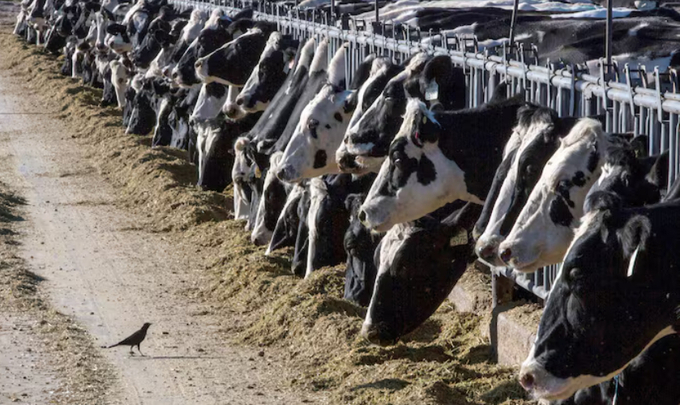November 24, 2025 | 20:39 GMT +7
November 24, 2025 | 20:39 GMT +7
Hotline: 0913.378.918
November 24, 2025 | 20:39 GMT +7
Hotline: 0913.378.918

Initial testing has not identified changes to the avian flu virus that would make it more transmissible to humans, according to federal officials. Photo: Rodrigo Abd/AP
A highly virulent bird flu first detected in dairy cows in Texas and Kansas this week has spread to additional herds, bringing the number of affected states to five and adding evidence the virus may be spreading cow-to-cow. The strain has been confirmed in Michigan, and presumptive positive tests have been reported from Idaho and New Mexico, federal officials said Friday.
Earlier in the day, the U.S. Department of Agriculture reported incorrectly that presumptive positive tests had also been found in Ohio.
The presence of the highly pathogenic avian influenza — commonly known as HPAI — has been confirmed in a Michigan dairy herd that recently received cows from Texas, according to a statement Friday from the USDA.
The virus strain found in Michigan is similar to a strain confirmed in Texas and Kansas that appears to have been introduced by wild birds, the USDA statement said.
“Spread of symptoms among the Michigan herd also indicates that HPAI transmission between cattle cannot be ruled out,” according to the USDA statement.
Initial testing has not identified changes to the virus that would make it more transmissible to humans, according to the USDA.
“While cases among humans in direct contact with infected animals are possible, this indicates that the current risk to the public remains low,” the agency statement said.
Idaho officials announced Thursday that avian flu was detected at a dairy cattle farm in Cassia County after the facility recently imported livestock from another state that had identified HPAI in cows. It did not provide details.
But in an interview, state veterinarian Scott Leibsle said avian flu was detected in the Idaho cattle after the farm imported cows from a Texas herd that had shown symptoms of HPAI.
“Cow-to-cow transmission is definitely playing a role in how this disease progresses. To what extent, we don’t know yet,” Leibsle said. It’s clear that infected wild birds spread the disease to herds in Texas and Kansas, he said. “But the herd of cattle that came up from Texas to Idaho, the birds didn’t follow,” the state veterinarian said.
Federal officials are monitoring closely and have advised veterinarians and producers to practice good biosecurity, test animals if they have to be moved, minimize animal movements and isolate sick cattle from the herd.
The USDA, Food and Drug Administration, and Centers for Disease Control and Prevention are investigating the illness among dairy cows, which is causing decreased milk production, low appetite and other symptoms.
Federal officials are also working with state and local public health officials to monitor for signs of diseases among people at the facilities where bird flu was detected.
Most infected animals have recovered after isolation, and few cattle deaths have been reported, the USDA said.
Idaho’s Leibsle said “not all dairy producers will want to wait one, two, three weeks” for dairy cows to recover. Some producers may decide to send the animals to slaughter as beef animals, he said. All those cattle will undergo the same rigorous food safety protocols.
The USDA statement said there continues to be “no concern about the safety of the commercial milk supply because products are pasteurized before entering the market, or that this circumstance poses a risk to consumer health.”
Dairies are required to send milk only from healthy animals into processing for human consumption. Milk from infected animals is being diverted or destroyed so that it does not enter the human food supply, USDA said.
In addition, pasteurization, which is required for milk entering interstate commerce for human consumption, inactivates bacteria and viruses, including influenza, in milk.
Officials have long cautioned consumers to avoid raw or unpasteurized milk. FDA’s long-standing position is that unpasteurized milk can harbor dangerous microorganisms posing serious health risks to consumers.
Because of the limited information available about the transmission of HPAI in raw milk, the FDA recommends that the dairy industry not manufacture or sell raw milk or unpasteurized cheese products made with milk from cows showing symptoms of illness, including those infected with avian influenza or herds exposed to cows infected with the virus.
(WP)

(VAN) Brazil's COP30 presidency pushed through a compromise climate deal on Saturday that would boost finance for poor nations coping with global warming but that omitted any mention of the fossil fuels driving it.

(VAN) Poultry farmers in the UK have been warned that they could face one of the worst winters yet for bird flu.

(VAN) Prices of main-crop paddy have risen sharply, with jasmine rice hitting 16,100 baht per tonne — the highest level in years.

(VAN) In Brazil, FAO unveiled a series of reports and initiatives showing how sustainable agrifood systems are a solution to the climate crisis.

(VAN) With names like neodymium and dysprosium, rare-earth elements sound exotic — and their perceived scarcity has only added to the mystique.

(VAN) In a new study published in Trends in Biotechnology, researchers used a gene-editing technology called CRISPR to increase a fungus's production efficiency and cut its production-related environmental impact by as much as 61%- all without adding any foreign DNA.

(VAN) A top official in Beijing’s Cop delegation says China is committed to clean energy – but US’s absence is a problem.